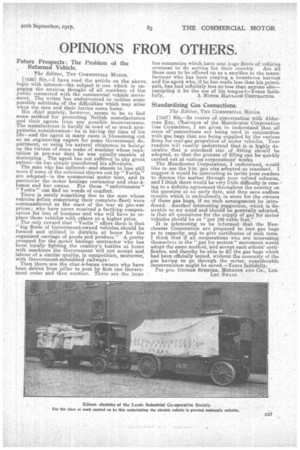OPINIONS FROM OTHERS.
Page 21

If you've noticed an error in this article please click here to report it so we can fix it.
Future Prospects: The Problem of the Returned Vehicle.
The Editor, THE COMMERCIAL MOTOR.
[]5361 Sir,—I have read the article on the above topic with interest—the subject is one which is engaging the 'anxious thought of. all members of the public connected with the commercial vehicle movement. The writer has endeavoured to outline some possible solutions of the difficulties which may arise when the Men and their lorries come home.
His chief anxiety, however, seems to be to find some method fur protecting 'British manufacturers and their agents from any possible inconvenience. The manufacturer is hardly in need of so much sympathetic consideration—he is having the time of his life—and the agent in many cases is blossoming out as an engineering expert for some Government department, or using his natural eloquence to bolstjr up the virtues; of some make of machine whose reputation in pre-war days he was equally capable of destroying. The agent has not suffered to any great extent—he has simply transferred his affections. The man who has suffered—and stands to lose still more if some of the solutions thrown out by " Vectis " are adopted—is the commercial motor user, and in particular the motor haulage contractor and char-abanes and bus owner. For those " unfortunates " " Vectis " can find no words of comfort.
There is surely something due to the men whose vehicles (often comprising their complete fleet) were commandeered at the start of the war at pre-war prices; who have never received -a farthing compensation for loss of business and who will have to replace those vehicles with others at a higher price.
The only reward that " Vectis " offers them is that "big fleets of Government-owned vehicles, should be formed and utilized in districts at home for the organized carriage of goods and produce." A pretty prospect for the motor haulage contractor who has been loyally fighting the country's battles at home with machines the Government will not accept and labour of a similar quality, in competition, moreover, with Government-subsidized railways: Then there are the char-a-bases owners who have been driven from pillar to post by first one Government order and then another. There are the large bus companies which have sent huge fleets of vehicles overseas to do service for their country. Are all these men to be offered up as a saceifice to the manufacturer who has been reaping a bounteous harvest and his agent who, if he has made less than his principals, has had infinitely less to lose than anyone else— excepting it be the use of his tongue1—Yours
A MOTOR nAuLAGE CONTRACTOR.
Standardizing Gas Connections.
The Editor, THE COMMERCIAL MOTOR.
[154371 Sir —In course of conversation with Alder
man Kay, Sir,—In of the Manchester Corporation Gas Committee, I am given to understand that all sizes of' connections are being used in conjunction with gas bags that are being supplied by the various firms for coal-gas propulsion of motor vehicles. Your readers will readily understand that it is highly desirable that a standard size of fitting should be adopted, so that the process of filling can be quickly carried out at various corporations' works.
The Manchester Corporation, I understand, would like to see. the 2-in.' gas size adopted as standard. I suggest it would be interesting to invite your readers to discuss the matter .through your valued columns, and I think there would be very little difficulty in corning to a definite agreement throughout the country on the question at an early date, and thus save endless trouble which is undoubtedly in store for the owners of these gas bags, if no such arrangement be introduced. Another interesting suggestion, which is desirable to my mind and 'should be generally adopted, is that all quotations for the supply of gas for motor vehicles should he at "per 100 cubic feet." It is intezesting to be informed that the Manchester Corporation are prepared to test gas bags as to capacity, and to give certificates of such tests. I think that if all corporations who are interesting • themselves in the "gas for motors" movement would adopt the same method, and accept each others' certificates, and thereby be able to fill the gas bags which had been officially tested, without the necessity of the gas having to go through the meter, considerable Inconvenience might be saved.—Yours faithfully, '
Per pro. GEORGE SPENCER, MOULTON AND CO., LTD.
LEO SWAIN,
























